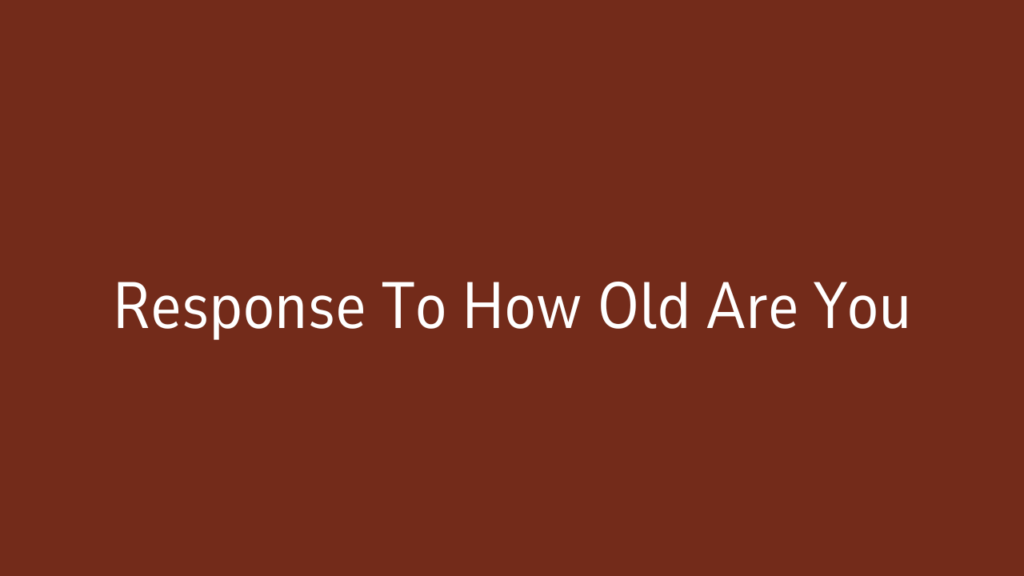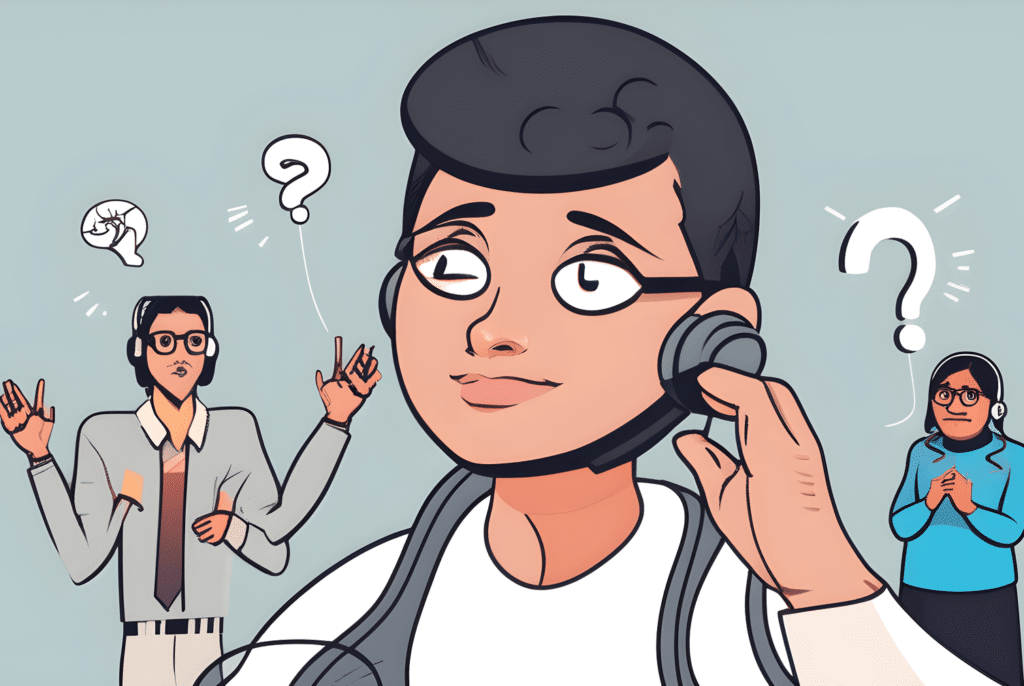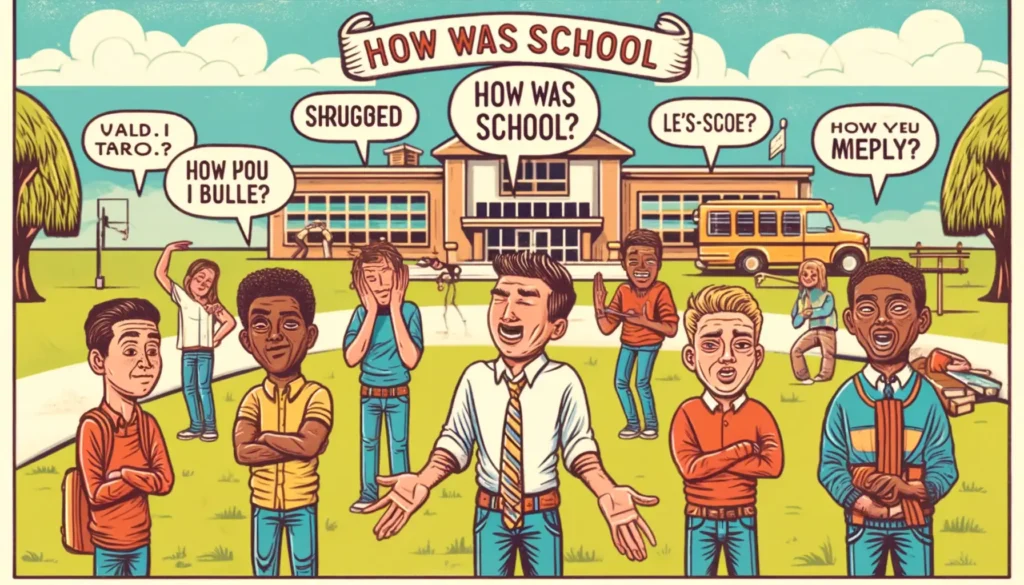How old are you?” is one of the most common questions we encounter throughout our lives. Whether it’s asked in casual conversation, at the doctor’s office, or even during job interviews, the question is simple but can carry a lot of weight. How we answer it can depend on many factors, including our personal comfort level, social expectations, and the context of the conversation.
While this question might seem like a straightforward inquiry, the way we respond can vary greatly based on our age, culture, and the situation. This article will explore different ways to respond to “How old are you?” and why people sometimes hesitate to share their age. It will also discuss the significance of age in various settings, and why it’s okay to feel differently about the question at different stages in life.
Why Do People Ask, “How Old Are You?”
Age is a fundamental piece of information that often helps others understand your stage in life, experiences, and sometimes even your role in society. The question “How old are you?” is usually asked for a variety of reasons:
- To Know Your Stage in Life – Age can indicate where you are in your educational or career journey. It can also give insight into your potential family or personal responsibilities.
- To Establish Common Ground – People often ask about age to determine whether they share similar experiences or interests based on generational differences.
- To Assess Maturity or Responsibility – In some situations, age can be used to gauge whether someone is of legal age for certain activities (driving, voting, drinking).
- Curiosity – Sometimes, people are just curious about how old someone is, especially if they appear much older or younger than they look.
While these reasons can be innocuous, the context of the question is important because it can also make us feel uncomfortable or pressured to give a particular answer. Some people may feel that revealing their age makes them feel vulnerable or judged, while others may embrace it as a sign of maturity or experience.
How to Respond When Asked, “How Old Are You?”
Your response to the question “How old are you?” will often depend on the context in which it is asked, how comfortable you are with your age, and how you feel about the person asking. Below are some general ways to respond, categorized by situation:
1. Simple and Direct Responses
For many people, the simplest way to answer this question is by stating their age directly. These responses are appropriate for situations where the question is asked casually or when there is no reason to be hesitant about revealing your age.
- “I’m 30 years old.”
- Straightforward and clear, this answer leaves no room for ambiguity. It’s the go-to response in most social settings, as long as you’re comfortable with your age.
- “I’m 25, turning 26 next month.”
- This response can be useful if you’re near a birthday or if you want to include a little extra information. It gives the questioner an added sense of your timeline in life.
- “I’m 45 years old.”
- This simple answer works well for most scenarios. You just provide the number and move on.
- “I’m 18, just became an adult!”
- Saying your age with excitement can show that you’re proud of entering a new life stage. It could be a fun, lighthearted response, especially for younger individuals.
- “I’m 60, and I feel great!”
- For those in their senior years, responding with pride and positivity can help challenge stereotypes around aging.
2. Hesitant or Defensive Responses
Not everyone feels comfortable sharing their age, especially if they are sensitive about how they appear in comparison to their peers. If you are unsure about sharing your age, you may opt for a more guarded response.
- “Why do you want to know?”
- This response flips the question back to the asker, which can be a good strategy when you’re unsure why they’re asking. It can also be used to challenge their curiosity.
- “Age is just a number!”
- This response can be a fun way to deflect the question and avoid directly answering. It sends the message that age is irrelevant in determining who you are as a person.
- “I don’t really keep track of age anymore.”
- Some people prefer not to focus on age, especially as they get older. This answer suggests that they don’t view age as an important aspect of who they are.
- “Let’s just say I’m old enough to know better, but still young enough to enjoy life!”
- This playful response can be a way to lighten the mood while avoiding a precise age.
- “I’m at that perfect age where I’m still young but wise.”
- This is a diplomatic response that avoids giving an exact age while emphasizing maturity and experience.
3. Humorous Responses
If you’re someone who likes to add humor to conversations, you might respond to “How old are you?” in a way that makes others laugh while still sidestepping the direct question.
- “I’m 25… with 10 years of experience!”
- This is a fun way of indicating that while your biological age may be one thing, you have a lot of life experience beyond what the number says.
- “I’m 21… with 15 years of practice!”
- Similar to the previous one, this humorous answer can bring some lightheartedness to the conversation.
- “I’m older than I look, but younger than I feel!”
- A playful way of saying that age is all relative and doesn’t define how you feel or act.
- “I’m 29… again.”
- Many people joke about turning 29 multiple times, particularly if they don’t want to reach 30 just yet. This humorous response lightens the mood and offers a playful escape.
- “I’m still a work in progress!”
- A funny way to deflect the question while implying that you’re not defined by your age but instead by your ongoing personal growth.
4. Philosophical or Thoughtful Responses
Some people view their age as more than just a number—it reflects their experiences, growth, and journey in life. If you view age through a more philosophical lens, here are some responses you might offer:
- “I’m as old as I feel—some days, that’s 25, and other days it’s 85!”
- This response suggests that age is not just about the number, but also how you feel mentally and physically.
- “I’m at the age where I’ve learned to embrace every year with gratitude.”
- This reflects a mature perspective, showing that you appreciate the value of every year in your life.
- “I’m at the age where I’ve accumulated wisdom and experiences that I cherish.”
- This response emphasizes that age brings with it knowledge and life lessons.
- “I’m 40, and I feel like I’m just getting started!”
- This is a positive and empowering way to view aging, suggesting that age doesn’t limit your potential.
- “Age is a gift. Each year is another opportunity to grow and learn.”
- This thoughtful response suggests a deeper perspective on aging, one that values each passing year as an opportunity for personal development.
Why People Hesitate to Share Their Age
For some individuals, the question of age can feel uncomfortable or intrusive. There are many reasons why someone might hesitate to share their age, including:
- Fear of Judgment – Society often associates age with specific life milestones, such as marriage, children, or career achievements. People may feel judged if they haven’t reached these milestones yet or if they feel behind in life.
- Ageism – Negative stereotypes about aging can lead people to be reluctant about revealing their age, especially in workplaces or social settings where youth is valued.
- Feeling Self-Conscious – Some people feel self-conscious about how they look relative to their actual age. They might worry that sharing their age will lead to unwanted comparisons or criticism.
- Cultural Factors – In certain cultures, age is a private matter, and revealing one’s age can be seen as rude or unnecessary.
- Generational Differences – Older generations may sometimes feel uncomfortable about revealing their age, particularly in environments that place a premium on youth, such as the media or entertainment industries.
When It’s Okay Not to Answer
There are instances when it’s perfectly fine to avoid or sidestep the question of age altogether. If you feel that sharing your age isn’t appropriate for the situation, you can politely decline or deflect the question. Here are some situations where not answering might be your best option:
- In Job Interviews – In many countries, employers are prohibited from asking about age because it can be used to discriminate. If asked, you can respond by saying, “I prefer to focus on my experience and qualifications.”
- In Casual Social Situations – If someone asks your age in a casual or inappropriate setting, it’s okay to politely say, “I prefer not to say” or change the subject.
- If You Feel Uncomfortable – If you feel that your age will be used to judge or stereotype you, it’s okay to redirect the conversation or even humorously dismiss the question.
- In Professional or Formal Settings – If you’re in a formal setting and don’t feel the question is necessary, it’s acceptable to politely say, “I’d prefer not to share that information at this time.”
Conclusion: Age is Just a Number—But Context Matters
The question, “How old are you?” might seem simple, but it carries



